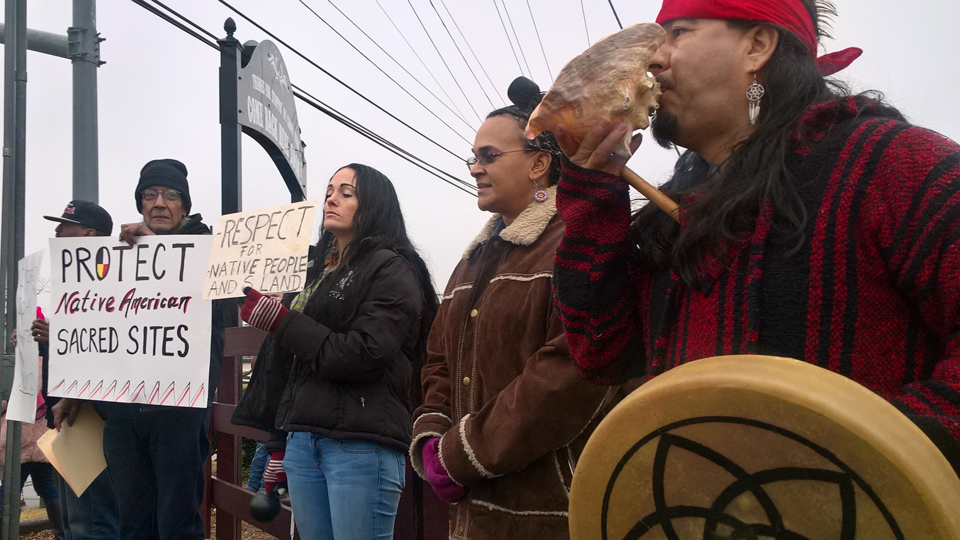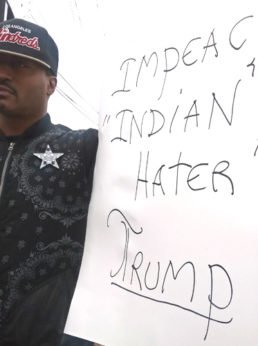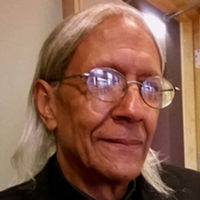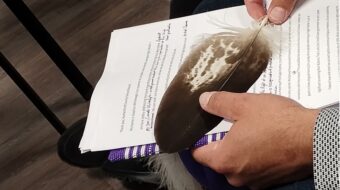
NASHVILLE — On Monday, January 8, the Native community here held a demonstration in protest of Trump’s visit to address the American Farm Bureau Federation’s (AFBF) 99th Annual Convention. Trump spoke at Nashville’s Opryland Hotel—the first time in 25 tears that a sitting president had addressed an AFBF convention.
The purpose of the protest, aside from spotlighting the administration’s retrograde Indian policies, was to assert the moral authority of the Native community to proclaim to Trump he was not welcome in Nashville. The press release issued by the American Indian Coalition (AIC), which sponsored the protest, stated, “This is Indian land—the land of the Cherokee, the Muscogee Creek, the Choctaw, and others—and Trump and his supporters do not belong in this land.” The sentiment further expressed was that Trump should be “impeached and sent home.”
Anti-Indian policies protested
The demonstration was directed against Trump’s anti-Indian policies and expressions, including his adulation of the “Indian Killer” Andrew Jackson, whose portrait hangs in the Oval Office; his proposed budget cuts to the already severely underfunded Indian Health Service; his recent near destruction of national monuments sacred to Indigenous people; his complete disregard and further violation of Native American-U.S. treaties; and his ramming through of the Dakota Access Pipeline (DAPL) across treaty land of the Standing Rock Sioux Nation. These were just a few of the outrages committed by this so-called president that prompted the angry response of the Nashville’s Indigenous people. The anger was accompanied by drumming and the sound of conch shells.
The AIC issued a press packet to the local media containing a meme, depicting a Native teaching the Pilgrims how to grow corn, with the logo “Feed a man corn, he eats for a day. Teach a man to grow corn, he kills you and steals your land,” targeting the basis of AFBF agriculture. The packed also encouraged the AFBF to “remember who were the first farmers of America and who taught them how to farm in this country.”

Among the slogans carried by protesters were “Impeach the “Indian Hater” and “Send him home.”
There was also another anti-Trump demonstration taking place at the entrance to Opryland focused on his anti-immigrant and anti-refugee policies.
Together, the two demonstrations totaled over 100 people coming out in a cold, drizzly rain. Most participants held to their posts in the hope of jeering at the Trump motorcade. Local news media kept announcing conflicting times for Trump’s airport landing and speaking times.
Trump and Bureau abandon family farmers
As for the farmers assembled at the AFBF convention, Trump did not satisfactorily speak to several of their concerns, including on immigration policy. Ironically enough, most of the AFBF delegates desire relaxing bans on immigrants because they depend on farm labor from Latin America. The other paramount issue for farmers was international trade, especially the North American Free Trade Agreement (NAFTA) between the U.S, Canada, and Mexico, which is now being re-negotiated.
Trump signed two executive orders at the convention promoting broadband Internet access for rural areas. But it must be noted that the executive orders didn’t provide any new funding, which is the main obstacle to broadband expansion.
Trump, narcissistically, told AFBF members: “Oh, are you happy you voted for me? You are so lucky that I gave you that privilege.” Preening and smirking at one point, he told the audience to “Get up,” demanding a standing ovation.
He claimed that he was “fighting for our farmers.” But his record clearly indicates his administration has been “fighting” for agricultural corporations and the largest industrial farms. The new tax law, which Trump has touted as a major accomplishment that benefits “working families, small business and…family farmers,” actually raises the tax burden for the lowest earning 20 percent of farming families. The richest 10 percent will get 50-70 percent of the law’s benefits.
Trump also asserted that the law relieves farmers from the “punishment” of “the deeply unfair estate tax,” permitting them to “keep your farms in the family.” But very few farm families are affected by the estate tax. In 2017, it affected only some 80 small family farms nationwide, a comparatively minuscule number.
The chief executive promised to “end chain migration” and also to “build the wall,” while saying nothing about the shortage of farmworkers impacted by his anti-immigration policies. Over 70 percent of U.S. farmworkers are undocumented.
Trump’s Nashville speech was indicative of his “big business” approach to agriculture. The AFBF is a powerful lobbying organization that, like Trump, sides with the interests of “big money.” The Bureau, besides claiming to represent farm families, is also a multi-billion-dollar network of insurance companies with extensive financial investments in some of the largest agribusiness enterprises. Of the six million member families the AFBF claims to represent, millions are not farmers at all, but insurance customers. Presently, there are just 2 million farms in the U.S., and the majority of farm families are in the midst of an income decline and a major farm crisis.
The Jacksonian legacy
But Trump, the “Indian Hater” that he is, could not conclude his remarks without referencing the “Indian Killer” Andrew Jackson. He praised Jackson for his role in the Battle of New Orleans. Of course, no mention was made of Jackson’s leadership roles in the genocidal campaigns against Indigenous people in the South, such as the Creek War of 1813, the Seminole campaigns of 1817, and the racist exterminations reaching an apogee with the Trail of Tears in the 1830s directed against all of the Native nations of the region.
This was Trump’s second visit to Nashville since taking office last year. His first was in March 2017, when he visited the Hermitage, the historic home of Andrew Jackson, to lay a wreath on his grave.
Trump can rest assured that when and if he ever returns to this city, he will find the same unwelcoming committee of Indigenous people waiting on him. This is not his country.












Comments